-
PDF
- Split View
-
Views
-
Cite
Cite
Tony M Korman, RE: “EARLY OUTPATIENT TREATMENT OF SYMPTOMATIC, HIGH-RISK COVID-19 PATIENTS THAT SHOULD BE RAMPED UP IMMEDIATELY AS KEY TO THE PANDEMIC CRISIS”, American Journal of Epidemiology, Volume 189, Issue 11, November 2020, Pages 1442–1443, https://doi.org/10.1093/aje/kwaa154
Close - Share Icon Share
In his recent article, Dr. Harvey Risch (1) makes an impassioned plea that we are unable to wait for results from randomized controlled trials of coronavirus disease 2019 (COVID-19) and should immediately roll out early outpatient treatment with hydroxychloroquine (HCQ) and azithromycin (AZ). Early treatment that prevents disease progression and hospitalization is desperately needed, and timing of initiation of antiviral therapy may have important effects on the outcomes of therapy for COVID-19 (2). Unfortunately, as Risch states, “based on laboratory and other preliminary evidence available to date,” no available treatment is “effective in preventing hospitalization for the overwhelming majority” of “symptomatic high-risk outpatients” (1), and there are potential hazards associated with HCQ + AZ.
In the International Journal of Antimicrobial Agents, Gautret et al. reported results from an open-label nonrandomized study which showed a significant reduction in numbers of patients with detectable virus but included only 6 patients treated with HCQ + AZ (3). The authors injudiciously recommended that COVID-19 patients be “treated with hydroxychloroquine and azithromycin to cure their infection and to limit the transmission of the virus” (3). The International Society of Antimicrobial Chemotherapy and the journal’s publisher have acknowledged that “concerns have been raised regarding the content, the ethical approval of the trial and the process that this paper underwent to be published” (4), and additional independent peer review is ongoing.
Dr. Risch contends that criticism regarding the small study size “only applies to studies not finding statistical significance” and that “once a result has exceeded a plausible chance finding, greater statistical significance does not contribute to evidence for causation” (1). However, small trials with very large treatment effects, particularly those with laboratory-defined efficacy, should be considered with caution; subsequent trials typically show decreased effects, and many findings lose their nominal significance (5). In a follow-up study of 1,061 patients (which excluded 350 patients with contraindications to HCQ and/or AZ treatment, refusal, or other reasons) from Marseilles, France, 4.4% had persistent viral shedding at day 10, and 4.3% had a “poor clinical outcome” (death, transfer to the intensive care unit, or hospitalization for 10 days or more), with a case fatality rate of at least 0.75% (6).
Risch cites other non-peer-reviewed “evidence” for his argument. A nonrandomized trial from São Paulo, Brazil, showed a reduced hospitalization rate for 636 outpatients treated with HCQ + AZ (1.9%) compared with a “control” group of 224 patients who “refused treatment” (5.4%) (7). A family practitioner in New York State proclaimed that of “approximately” 405 patients treated with HCQ + AZ + zinc sulfate, 6 were hospitalized for pneumonia and only 2 died (8). Both of these reports included patients diagnosed on “clinical grounds,” without laboratory confirmation.
Risch downplays the risk of potential adverse effects of HCQ + AZ. An international study of 323,122 patients with rheumatoid arthritis demonstrated an increased risk of 30-day cardiovascular mortality when AZ was added to HCQ (9). QTc prolongation of more than 500 ms occurred in 11% of hospitalized COVID-19 patients who were treated with HCQ + AZ (10). While cardiac toxicity may be less common in an outpatient cohort, regular QTc monitoring in this setting would be difficult.
Another important adverse effect of AZ use is the potential for the development of macrolide and other antibiotic resistance in gastrointestinal and respiratory-tract bacteria. AZ is a potent driver of the selection of resistance due to its very long elimination half-life, large volume of distribution, high intracellular and prolonged tissue concentration, and postantibiotic effect (11).
Remdesivir, which has demonstrated modest clinical benefit in hospitalized inpatients (12), is suggested as a possible alternative. However, even if it is shown to reduce disease progression, remdesivir requires intravenous administration and is not a practical option for outpatient therapy.
Dr. Risch declares that “it is our ethical and professional obligation not to just stand by ‘carefully watching’ ” (1) as people die. However, Zagury-Orly and Schwartzstein remind us to retain healthy skepticism and act “with caution and reason” (13). Anecdotal observations should generate hypotheses for randomized controlled trials of possible COVID-19 treatments. We need to remember the principle of clinical equipoise (14), particularly when considering potentially harmful interventions.
ACKNOWLEDGMENTS
In the last 2 years, T.M.K. received conference attendance sponsorship and was a speaker at a congress sponsored by Pfizer, Inc. (New York, New York). He also chaired a meeting organized by Gilead Sciences, Inc. (Foster City, California) (with no personal payment) unrelated to this work.




